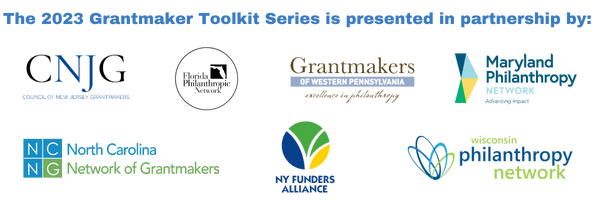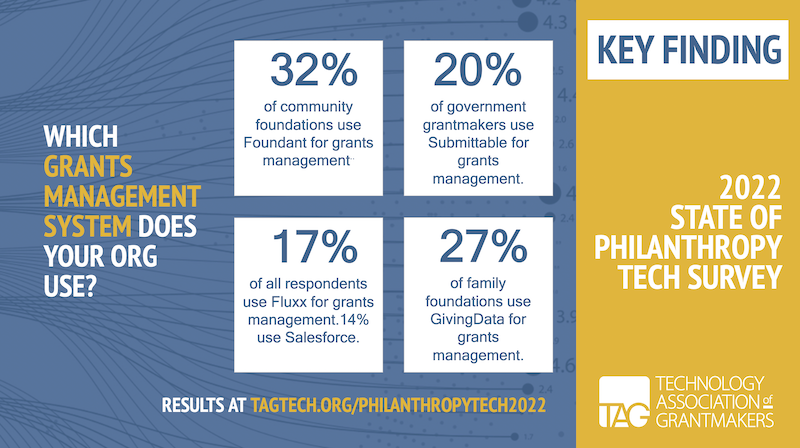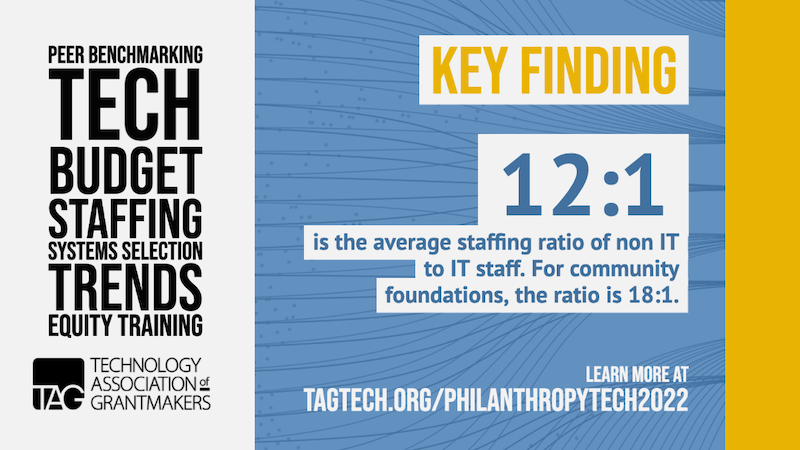Site Search
- resource provided by the Forum Network Knowledgebase.
Search Tip: Search with " " to find exact matches.
The New Jersey Council for the Humanities (NJCH) has announced $231,768 in grant funding to 19 organizations across the state.
The awards are split between 9 Incubation Grants and 10 Action Grants and represent 10 counties in New Jersey. Incubation Grants help organizations plan, research, develop, and prototype public humanities projects and events. Action Grants help organizations implement a wide array of humanities-based projects, including public programs, exhibitions, installations, tours and discussion groups.
“Our most recent grantees are bringing under-told stories from throughout the state and world to new audiences,” said Carin Berkowitz, Ph.D., executive director of NJCH. “They demonstrate that understanding our shared history is key to understanding our current world.”

Case study from Philanthropy New York documenting the formation, challenges and ultimate success of the Education Funders Research Initiative – an unusual funder collaborative that brought together funders for and against charter schools, funders with different views of testing and accountability, and funders with vastly different approaches to supporting education reform to identify and advance shared priorities.
A CNJG member queried our listserves on policies regarding: 1) number of vacation days for new full-time employees; 2) paid time off (PTO); and 3) working remotely. CNJG compiled the answers from responding members.
Today, the practice of CSR has matured to include strategic philanthropy, employee volunteerism, cause marketing, disaster response, peer-to-peer fundraising, nonprofit board service, and even incorporating social responsibility into core business practices and offerings. Within the pages of this ebook, you’ll hear from leaders who have successfully charted a course for each of these areas to play a role in the new world of CSR.
"What is the ongoing impact of social change on grantmaker support for grantees? How common is it for foundation staff to be back in the office? How can I leverage peer benchmarking to advocate for change within my organization?”
In July 2022, Technology Association of Grantmakers (TAG) conducted a survey to better understand the technology environment, practices, and perceptions in philanthropy. Now in its third version, the 2022 State of Philanthropy Tech survey compiled results from 277 grantmaking organizations throughout North America, the EU, and UK. The findings are fascinating!
Topics covered include:
· Technology budgeting and staffing
· Staff turnover and retention
· Remote, hybrid, and in-person work trends
· Cybersecurity breaches, training, and protections
· Trends in tool selection for grants management, remote work enablement, and more
Join TAG executive Director, Chantal Foster, and TAG Survey Committee Member, Tess Hanrahan of the Hewlett Foundation, for this interactive webinar that will explore key findings and trends just in time for your 2023 planning. TAG cultivates the strategic, equitable, and innovative use of technology in philanthropy. Their work builds knowledge, strengthens networks, and advances the social sector.
This program is for members of the following philanthropy-serving organizations: Maryland Philanthropy Network, Council of New Jersey Grantmakers, Florida Philanthropic Network, Grantmakers of Western Pennsylvania, Philanthropy Wisconsin, NY Funders Alliance, and North Carolina Grantmakers.
Webinar Recording
TAG’s State of Philanthropy Tech Survey Presentation Slides (and attached)
2022 State of Philanthropy Tech Survey
6 Tech Trends to Watch in Philanthropy
Selecting Systems for Community Foundations
Favorite Productivity Apps of Webinar Participants: Asana, Microsoft Planner, Calendly, Slack, Evernote, iCalender, Google Calendar, Doodle, DownDetector, Trello, Outlook, Monday.com, Microsoft Bookings, Docusign, OneNote
CNJG joined delegates from the across the country for Foundations on the Hill on February 25 - 28. The event included a policy conference followed by meetings on Capitol Hill.
Joining me, the CNJG delegation included Bill Engel, President, The Union Foundation; Sharnita Johnson, Vice President of Strategy, Impact and Communications, Victoria Foundation; Melissa Litwin, Early Childhood Program Director, The Henry and Marilyn Taub Foundation; Jessica Nugent, Senior Program Officer, Burke Foundation; Jonathan Pearson, Executive Director, and Renee Woodside, Senior Program Officer, The Horizon Foundation for New Jersey; Danielle Scott, President and CEO, and Bruce Rubin, Trustee, Pincus Family Foundation; Kortney Swanson Davis, President and CEO, Forman S. Acton Educational Foundation; Catherine Wilson, President and CEO, United Way Greater Newark; Alana Vega, Program Officer, and Hellen Zamora-Bustos, Leonard Lieberman Philanthropy Fellow/Program Associate, Fund for New Jersey; Nelida Valentin, Vice President - Grants & Programs, Princeton Area Community Foundation; and Lucy Vandenberg, Executive Director, Schumann Fund for New Jersey.  Bill and Lucy serve as co-chairs of the CNJG Policy Committee. For the last few years, we’ve also been joined by Linda Czipo, President and CEO, New Jersey Center for Nonprofits. Linda’s voice elevates our conversations and helps ground them in the work nonprofits do every day.
Bill and Lucy serve as co-chairs of the CNJG Policy Committee. For the last few years, we’ve also been joined by Linda Czipo, President and CEO, New Jersey Center for Nonprofits. Linda’s voice elevates our conversations and helps ground them in the work nonprofits do every day.
The 21st Annual Foundations on the Hill, hosted and presented by United Philanthropy Forum in partnership with Independent Sector and the Council on Foundations, is the largest annual public policy and advocacy conference dedicated solely to the philanthropic sector. In addition to meeting with legislators and government officials, FOTH attendees attended pre-conference programming, conference keynotes, expert panel sessions, and several receptions. As part of the conference programming, we learned about the All By April campaign, a nonpartisan effort encouraging philanthropy to make grants to nonprofits conducting election work by the end of April. The authors and researchers of the just released 2024 National Study on Donor-Advised Funds provided an overview of their key findings. We were introduced to the history and priorities of the Black Congressional Caucus Foundation, and their focus on developing thoughtful, creative and informed leaders. And we were reminded about the chilling impact recent Supreme Court rulings could have on the rights of donors to give in ways that align with their values.
We were pleased to meet with all 12 of our NJ Congressional and both Senate offices. We met directly with Congressmen Gottheimer and Kean, along with a quick photo meet-up with Senator Booker.
As part of our meetings, we advocated for the Charitable Act, H.R.3435/S.566 which would provide a non-itemizer deduction of up to 1/3 of the standard deduction; the Nonprofit Stakeholders Engaging and Advancing Together (SEAT) Act, H.R.3245, which would pave the way for stronger policymaking input from the charitable sector and improved data collection about nonprofits; and the Streamlining Federal Grants Act, H.R.5934/S2286, which would simplify the application and reporting requirements for federal grants. These bills strengthen the work of the philanthropic and nonprofit sectors.

 In addition to advocating for legislation that supports our work, and educating Congress about the social sector, FOTH not only helps build relationships with our Congressional delegation, but also provides opportunities for CNJG members to get to know one another. Our annual CNJG FOTH dinner is a time to relax and debrief about our meetings. New this year, a few of us took the opportunity to see Washington by moonlight.
In addition to advocating for legislation that supports our work, and educating Congress about the social sector, FOTH not only helps build relationships with our Congressional delegation, but also provides opportunities for CNJG members to get to know one another. Our annual CNJG FOTH dinner is a time to relax and debrief about our meetings. New this year, a few of us took the opportunity to see Washington by moonlight.
This year we were thrilled to welcome several CNJG members new to the FOTH experience!
 We’re also thrilled to welcome a new CNJG team member, Shakirat Odunsi, Manager of Communications! With over 20 years of experience in the marketing and communications field, Shakirat will lead and manage our communications strategy, marketing efforts for CNJG events, services and offerings, and our website and social media channels. Shakirat can be reached at [email protected].
We’re also thrilled to welcome a new CNJG team member, Shakirat Odunsi, Manager of Communications! With over 20 years of experience in the marketing and communications field, Shakirat will lead and manage our communications strategy, marketing efforts for CNJG events, services and offerings, and our website and social media channels. Shakirat can be reached at [email protected].
It was quite an eventful 3+ days. Thank you to the CNJG FOTH delegation for sharing your time and expertise. I’m proud that we were part of over 300 voices attending FOTH from across the country, sharing philanthropy’s positive impact, advocating for the nonprofit sector, and supporting legislation that strengthens our work.
Another important platform to strengthen and inform both the philanthropic and nonprofit sector in NJ is on June 18. The Spring Colloquium - Empowering the Future: Harnessing AI and Data for Philanthropic Social Impact, will explore how AI can enhance problem-solving without losing human connections, how it affects equity, and how philanthropy has engaged with AI for funding initiatives. Save the date – registration will be available soon!
Sincerely,
Theresa Jacks, President and CEO
Council of New Jersey Grantmakers
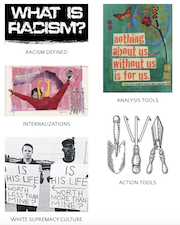
CNJG's Storify content from their Signature Events.
The Newark Philanthropic Liaison is a unique partnership between the Council of New Jersey Grantmakers and the City of Newark, supported by several foundations. Read more about the Liaison’s work In these reports. Due to several transitions, there were no written reports between 2015 and 2022.
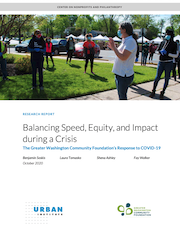
The COVID-19 public health and economic crisis has changed our world as we know it. As employers moved to remote work, schools shifted to distance learning, and businesses closed completely, it became clear that the impact on residents, nonprofits, and businesses was far greater than anyone could have ever imagined.
In response to the growing and evolving needs of our region, the Greater Washington Community Foundation established the COVID-19 Emergency Response Fund to raise and rapidly deploy funding to local nonprofits providing food, shelter, educational supports, and other critical services.
From the beginning our goal was clear: to address the immediate needs and reach adversely affected communities, particularly low-income households and communities of color. We know all too well that in a crisis like this, these marginalized communities are hit the hardest, and often take the longest to recover.
In times of crises, The Community Foundation is our region’s philanthropic first responder, bringing together individuals and families, philanthropic peers, corporate partners, and local government advisors to address community issues. Building on our rich history of emergency response work, we grounded our COVID-19 response efforts in a similar coordinated approach.
This report chronicles the steps taken, under immense pressure, to develop a coordinated emergency response effort to support a broad range of needs across the region. Once again this effort has demonstrated that working in partnership and close collaboration with our philanthropic peers and local government advisors is an effective way to manage a response to both urgent and longer-term needs.


